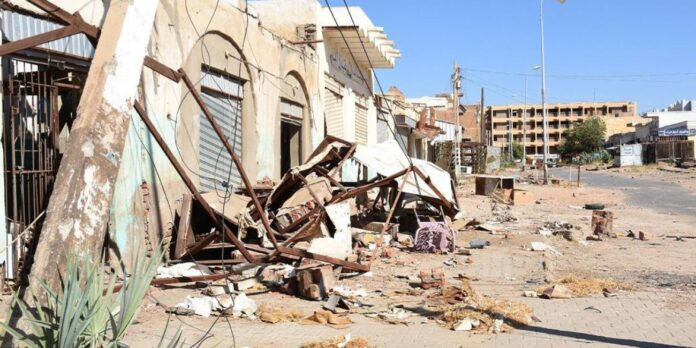A devastating attack on the Saudi Hospital in El Fasher, Sudan, has left at least 70 people dead and 19 others injured, according to the World Health Organization (WHO). The assault on January 26, 2025, which targeted the only operational hospital in the city, highlights the deepening humanitarian crisis in the war-torn region of Darfur.
The Saudi Hospital, located in the capital of North Darfur, was housing patients and their relatives at the time of the attack. Tragically, the strike led to a significant loss of life, with many patients in critical condition being caught in the violence.
Dr. Tedros Adhanom Ghebreyesus, the Director-General of the WHO, condemned the attack in a statement, underscoring the severity of the situation. He took to social media platform X (formerly Twitter) to express his outrage: “The appalling attack on Saudi Hospital in El Fasher, Sudan, led to 19 injuries and 70 deaths among patients and companions,” he wrote, emphasizing that this hospital was the only remaining facility offering medical care to the people in the city.
The WHO chief stressed the urgent need for unimpeded access to healthcare facilities in Sudan, as ongoing violence continues to devastate the country’s fragile health infrastructure.
Conflict Between SAF and RSF Escalates
The attack on the hospital is the latest escalation in the brutal conflict between the Sudanese Armed Forces (SAF) and the paramilitary Rapid Support Forces (RSF). This deadly power struggle, which began in April 2023, has already claimed tens of thousands of lives and displaced millions across the country.
The fighting, largely concentrated in Sudan’s western region of Darfur, has crippled not only civilian life but also the country’s already frail healthcare system. The Saudi Hospital in El Fasher was the last functional medical facility in the city, making it a critical lifeline for the local population.
WHO officials have expressed grave concern over the growing trend of attacks on healthcare centers, calling it a violation of international law. Dr. Ghebreyesus reiterated the organization’s call for an immediate cessation of violence against medical sites, which are meant to remain neutral zones in conflict zones.
In his statement, Ghebreyesus also pointed out that another health facility in Al Malha was attacked shortly after the Saudi Hospital assault, further deepening the crisis.
The Human Cost of the Conflict
Local sources, including officials in Darfur, have blamed the RSF for the Saudi Hospital assault. The paramilitary group, which has seized large swathes of Darfur, has been a dominant force in the region since the conflict’s inception. Despite facing resistance from SAF-aligned forces, the RSF continues to hold significant ground in the west, contributing to the prolonged instability.
El Fasher, the largest city in North Darfur, has been under siege by the RSF since May 2023. However, the Sudanese army has fought fiercely to defend the city, preventing the RSF from fully taking control. The protracted conflict has resulted in widespread civilian suffering, with no end in sight.
Efforts to broker peace between the warring factions have been unsuccessful. Multiple ceasefire attempts mediated by Saudi Arabia and the United States in Jeddah have failed to hold, with both sides accusing each other of violations. This failure to reach a lasting agreement has intensified the humanitarian crisis.
An Unfolding Humanitarian Disaster
As the conflict drags on, the humanitarian situation in Sudan grows increasingly dire. The UN has warned that the country is on the brink of famine, with millions of people facing food insecurity and a lack of basic services.
A coalition of international organizations, including the United Nations and various humanitarian groups, has called for immediate action to protect civilians and healthcare facilities. The recent attack on the Saudi Hospital in El Fasher serves as a stark reminder of the vulnerabilities of health workers and patients in conflict zones.
“The situation is unbearable for civilians caught in the middle of this war,” Dr. Ghebreyesus stated. “The international community must do more to ensure that humanitarian aid reaches those in need and that hospitals are protected from further attacks.”
A Nation in Crisis
Since the outbreak of conflict, Sudan’s transition to civilian rule has been derailed, with both the SAF and RSF vying for control. The civilian population has borne the brunt of the violence, with many forced to flee their homes, seeking refuge in other parts of Sudan or in neighboring countries.
The world has watched as Sudan descends into chaos, with little intervention from the international community to halt the bloodshed. Amidst the carnage, Sudanese citizens remain resilient, but their future remains uncertain.
The attack on the Saudi Hospital, which provides critical healthcare to one of Sudan’s most vulnerable regions, is a grim reflection of the country’s ongoing crisis. With healthcare facilities destroyed and the population in peril, Sudan’s road to recovery seems ever more distant.
A Call to Action
As the death toll continues to rise, international organizations, including the WHO, are urging a concerted global effort to restore peace and protect civilians.
“We cannot allow Sudan’s healthcare system to be dismantled further,” Dr. Ghebreyesus declared. “The world must come together to ensure that healthcare workers can do their jobs without fear of attack, and that the people of Sudan have access to life-saving medical care.”
With Sudan’s future hanging in the balance, it is clear that urgent action is needed to end the conflict, protect healthcare facilities, and prevent further loss of life. As the world watches, the question remains: will the international community take meaningful steps

